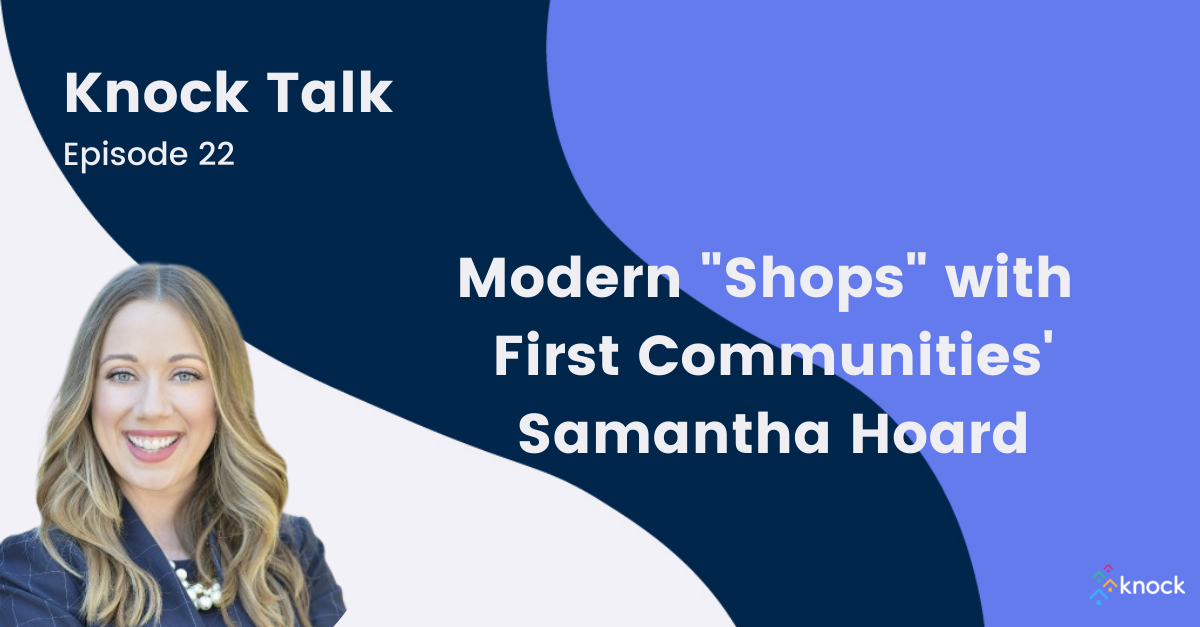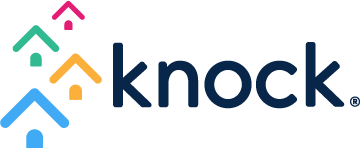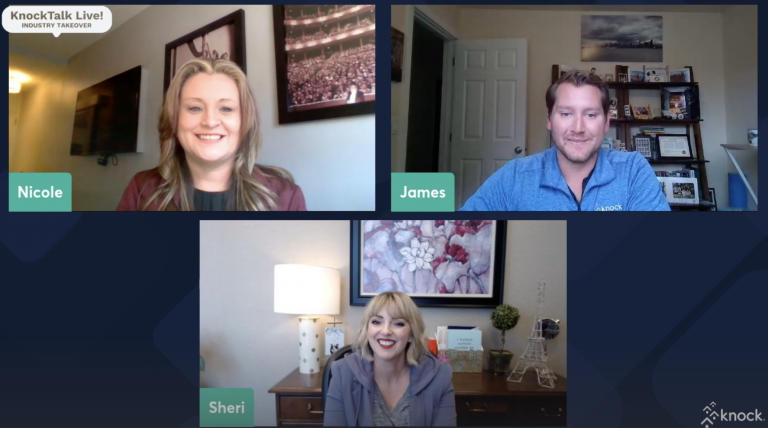Knock Talk: Episode 22 – Modern “Shops” with First Communities’ Samantha Hoard

Gone are the days of a simple phone call or in-person secret shop at an apartment community.
Today, property shops encompass the entire renter experience from an inbound lead from your website all the way through move-ins.
In this episode of Knock Talk, Lucas Bourgeois, Knock VP, sat down with Samantha Hoard, senior marketing director at First Communities, to learn how her teams conduct modern property shops that improve leasing performance.
Full Transcript
Lucas: Hey, everybody, and welcome to this episode of Knock Talk where we’re shedding light on all things multi-family intelligent front office tech. I’m super excited to be here today with my good friend and partner Samantha Hoard. She’s the senior marketing director at First Communities. This will be our second time taking part in the Knock Talk. Welcome, Sam.
Samantha: Thanks so much, Lucas. Excited to be back with you guys. Super awesome topic today. Got a lot of great things to talk about.
Lucas: Guess what we’re talking about today everybody we’re talking about property shops. Two words that may make some leasing folks cringe and the hair stick up on the back of their necks and some other operations folks really smile. Property shops really bring a lot of emotions. Good, bad, and different, right?
Samantha: Strike the hearts of some with fear, others know it’s their time to shine and our goal is to make sure everyone feels the latter rather than the former, right?
Lucas: Yes, exactly. I know you’re an expert, I’ve actually been site before and had shops so I know what people feel out there. I’m super excited, Sam, to talk about First Communities approach at property shops and shed some light on that. Let’s start out and talk about why shops are so important.
Samantha: Absolutely. I think back to when I was on-site and I will tell you, I probably thought I got shopped once a week. I don’t know what kind of budget I thought we were working with at the time, had no real concept of that as a leasing agent, but it was something I was always super fearful of and conscious of. In hindsight, it’s something that’s really supposed to be a tool to make you better and to help us inspect what we expect from our on-site teams. Nothing scary about that.
As long as you’ve got the tools, the training you’re set up for success, it should be a piece of cake. For us, I think it’s not a secret that over the last 5, 6, 7 years, First Communities has really spent a lot of time invested a lot of money, a lot of resources in our learning and development team, our platform, our processes. The shop program has evolved significantly over the last couple of years into what it is today. It’s really something that we use to help measure the success of all of our other training and learning and development opportunities put together.
Lucas: I feel like a lot of folks are using shops out there and a lot of organizations, but for organizations that aren’t, can we break it down and just describe what is a property shop?
Samantha: Yes, absolutely. We actually use a couple of different kinds of shops. Everybody has their own program. One of the things that’s really nice that you’ve seen over the last couple of years is people really customizing their shop to reflect the customer experience they want to provide. Across First Communities, you’re going to see a couple of different types of shops. First, we’re going to shop via internet.
We’re really going to be looking at how quickly our team responded, were they professional in their response time, and the manner in which they responded, did they continue to sell the property via email? Did they look to schedule an appointment, which we’ll get into more about what that means exactly later? We’re going to be doing a phone shop, did they answer the phone? We all know, especially in the year 2021, people are busier than ever. We’re booming.
No off-season. First, do they answer the phone? Were they pleasant? Were they professional? Did they get your contact information? Did they ask where you were calling from? Even though we know if they’re using Knock, we already know that, and then the third shop we’re going to be using is an on-site shop. It’s a combination that person will have already called and emailed the property. They should already have started to build rapport with that prospect, but did they stand and greet? Did they give a great tour? Did they follow up on that on-site shop? All of those things are components of our shopping program today.
Lucas: I feel like that’s super insightful for folks that aren’t using shops today. First Communities, you guys have a big portfolio. One of the things that I know that’s unique about your portfolio is you use different CRMs or no CRM at all, right? Explain, so I know you’ve recently just done a property shop process. Can you explain the different types of platforms that you use and maybe some differentiators on the scoring and what properties or what systems came out on top?
Samantha: Yes. As a fee manager, we work with a lot of different clients with different priorities, different budgets, different asset classes, which is one of the things that a lot of people are really drawn to proceed, it is about as an owner, you’ve got a lot of opportunity to really help drive what platforms your onsite teams are using. We’ve got a handful of owner groups that for whatever reason have elected not to use a lead management platform and that’s okay, that’s something we can workaround.
We’ve been able to really set those teams up for success using other methods and happy to report that those teams are still getting shopped, still a part of that program and still, we’re able to inspect what we expect from them. Otherwise, we do have a couple of other lead management platforms that are utilized throughout the company. I won’t name names, but very happy to say that overall, the Knock properties performed really well on all three types of shops.
I think a lot of that has to do with the different functionality, but also the user interface that the on-site teams work with. One of the big scores that is very heavily weighted on all types of shops is the response time, so because Knock prioritizes that first contact within the team dashboard, they’re able to score really well in that category, which gives them a nice leg up.
One of the other things that I think really has set Knock apart is the way follow-ups are scheduled, whether it’s auto-scheduled or the team scheduling it based on their time. Knock’s auto-scheduling really aligns with our goals and the standards within FCM. Right off the bat, as long as you’re following the Knock auto-scheduled follow-ups, you’re going to ace that section of the shop as well.
Lucas: What I’m hearing from you is overall, you did shops across your portfolio and the properties that were on Knock CRM ended up having better shop scores across the board.
Samantha: Knock came out on top.
Lucas: Knock’s on top. We’re knocking it out of the park. I think that it’s insightful to understand that response time, as well as the prioritization of new leads, is what’s helping that. Is there anything else you think that Knock’s providing to your teams that are giving them those tools to ace those shops every time?
Samantha: Sure. I think we’ve talked about it before. One of the things that I really value in our partnership with Knock is the continued support and training that our teams receive. It’s one thing for us as a marketing team or learning and development team to have those touchpoints with our teams, but for Knock to be able to have that continued reinforcement and the teams to continue their learning path with Knock directly, I think they’ve got a lot of comfort in the database– excuse me, in the dashboard.
They feel really good in and out of the system, whether it’s, they’re using it on their laptop, their desktop or they’re using it in Knock tours, they’ve got a lot of comfort throughout the entire process. I think that goes a long way with them being able to efficiently, effectively manage their leads.
Lucas: Okay, perfect. I think that our audience is understanding what you’re saying and I’m understanding that Knock helps you out. How do you at First Communities fail or shop? Obviously, cringe, some folks have failed the shops in their days and it may not be because of them, it might’ve been because they didn’t have the system in place that would set them up for success, but at First Communities, what is considered a failed shop?
Samantha: One of the things that I think probably sets us apart from some other management companies is that, failure to follow up results in an automatic shop right off the bat. We spent a lot of money to acquire that lead and to work them through the funnel. By you not following up, we really want to drive home that that’s not acceptable and that’s not an align with the customer experience that we expect to provide on a day in day out basis, regardless of asset type class ownership group.
That’s one thing that I think is definitely different. That’s something that takes some people a little while to get comfortable with depending on where they are in their learning and development path. One of the things that’s also unique about our shop program is if, for any reason, follow up or otherwise you do fail a shop, whether it’s internet, whether it’s phone, whether it’s onsite, you are going through receive an action plan. Our learning development team is going to actually have a one-on-one with you and your manager to make sure that you guys both have the opportunity to go through, discuss, and create a path to success moving forward.
We shop on a quarterly basis in the event that someone were to shop, they would likely be reach up sooner than that following quarter. The last thing we want is for someone to be really struggling to understand the principles of leasing for months at a time. If you went every quarter, you go six months with someone really just not feeling comfortable and confident. Ultimately, that’s what the shop program is supposed to be evaluating is someone’s basic understanding and application of leasing sales techniques, principles not really just are they passing a shop.
Lucas: You had mentioned in your previous answer, that tours were something that you were to watch it, like watching, and it’s part of the shock factor. How did tours come into play when you come to like ranking shots?
Samantha: We’re looking at things on an individual shop basis, but then we’re also looking at an aggregate. Obviously, the tour shop is a culmination of a lot of different things. It takes a lot to get somebody into tour these days. We’re looking at different pieces of it. We’re looking at the scheduling of the tour. We’re looking at whether the onsite team offered all of the types of tours that the property has available. When you called to schedule your tour, Lucas, did we offer you a self-guided tour? Did we offer you a zoom tour? Did we offer you a virtual tour or did we just try and get you in the door?
We want to make sure that we’re offering all of those things that are available to them, especially as we continue through this crazy year and a half that we’ve experienced, and then we’re really looking at the experience. One of the things that’s really important about our shop program is its overall goal is to just drive the customer service and sales and leasing mindset that we’re trying to drive at First Communities. Did you do that from start to finish?
Then of course, like I said, did you follow up? Because without follow-up, none of it means anything. Did you ask for the money? That’s another big one and that’s something that takes people wanting to get comfortable with when they’re new to leasing. All of those things are looked at. Your professionalism, your curb appeal, it all rolls into one big package to make sure that we’re really able to deliver on the quality customer experience over and over again.
Lucas: It seems like there’s a lot that comes into factor when you’re ranking these shops, right? There are the leasing agents. There’s a lot of pressure, and it can be stressful. Do you have any advice for those leasing teams out there on how to handle a shop? Because I remember back in the day, when I worked on-site, everybody was a shop, right? You’re like, “I know this person’s a shopper.” They were never, but any advice on those folks that maybe paranoid about shops or may keep them up at night.
Samantha: A couple of things that I was told when I was on-site that really I stayed with me for a long time. If you stay ready, you never have to get ready. If you treat each day, each prospect, each applicant, each resident, with the customer experience and level of attention to detail that you should, you never really have to worry about getting shopped. I get it, being on-site is hectic, it’s hard, we’re constantly throwing new challenges at you, so putting yourself in a position where as soon as you are working with someone, whether it’s a prospect, resident, or beyond, you’re really dedicating your time and attention to them, that’s going to set you apart immediately, and help you succeed, whether it’s a shopper or not.
Lucas: I feel like that’s a lot to manage, and a lot for your teams to take on for stress. You guys have implemented a lot of technology to help during the pandemic. What do you think the technology that you’ve implemented? What are you going to keep on into the future? As far as tech for, and then two prompt questions. The technology that you implemented, what do you think you’re going to keep into the future, and then have you implemented anything new to help with shops?
Samantha: I think a lot of what we’ve implemented is here to stay. I don’t see us ever going back away from self-guided tours. I think that’s becoming a bigger part of our marketing stack, and I think it’s something more and more prospects are looking for, which is awesome. I think a lot of the things that we have added in the last year and a half around identity verification are here to stay. I think a lot of the things that we have done as far as communication tools and types are here to stay. We’ve realized that not every resident wants an email blast.
A lot of them want a text message, and through Knock, our teams have the ability to quickly check both of those boxes. Regardless of who you are, you’ve got access to the information you need. I really don’t see us peeling back any of the technology we’ve added in the last year and a half, which is nice because as we all know, adding new technology is such a big lift, and it requires a lot of investment from everyone, a lot of buy-in. It takes a lot of mutual effort to make sure that it’s successful. It’s exciting to see us moving forward with a lot of those products and processes. You’re going to have to remind me what part two was.
Lucas: Have you implemented any new technology, that helped shops or anything to implement shops or help your team?
Samantha: We’ve had the same shop partner for quite a few years now. One of the things that I think is really great about our shop program is we’ve got the ability to change things. As we were really getting into the nitty-gritty of the pandemic, we were still wanting to inspect what we expect to make sure that the onsite teams were comfortable carrying out the new processes and procedures that we have put in place.
You’ll see, in our shops in Q1 and Q2 of this year, that there are questions about PPE. There are questions about social distancing, and I don’t think that that would have been something we were able to do if we didn’t have a partner that understood our need to make adjustments so quickly. One of the other things that we really changed as a part of the shop program and placed a lot more weight on was responsiveness.
I think back a couple of years and you were doing really well if you were answering your leads, same business day, eight hours. That was great. One of the things about the pandemic with everyone being home and glued to their devices is there is an expectation of a lot more immediate responsiveness, and that’s something that we adjusted our shops to really help drive home for the onsite teams.
Right now, eight hours, same business day, you’re passing, but you’re not getting an A, we’re looking for closer to that. Two to four hours of responsiveness to really be more competitive, and make sure we’re delivering again, that level of customer service and responsiveness, the prospects residents expect today.
Lucas: It’s immediate. You bought something online, you want that receipt in your inbox the second after you hit send. It’s same if you’re shopping for an apartment, you want to know that your inquiry has been received and your appointment’s been scheduled.
Samantha: You’re immediately setting that expectation and giving first impression. Whether it’s your autoresponder and how well you’ve customized it, and the information that it contains, and helps walk the prospect through the next steps, that’s immediately a first impression, even if it is an autoresponder, prospects want to see that you took the time to really set things up correctly and then from there, how quickly they actually are contacted by a member of your team means everything. If you’re taking eight hours, chances are your comp down the street has already responded and scheduled a tour, you’re out. We don’t want to be the one that’s out.
Lucas: Well, Sam, we– Samantha, I should say, I call you Sam, but we appreciate you so much today. We had a little education session on Knock Tours and we talked about property shops. One last thing that we always ask our viewers and what is it that you’re most excited for in this multi-family space in years to come.
Samantha: Oh boy, I guess we didn’t prep on this question. I think, just the continued emphasis on the onsite teams experience. We’ve been in a space for a really long time where everyone was really focused on the next shiny object. I think we’ve realized as an industry that shiny is great but implementable, sustainable solutions are really what we’re looking for and I think you see in our tech stack and in the partnerships that we’ve elected to really give our time and energy to we’re looking at things that are here for the long haul. If we’re going to put the time and resources into rolling something out, it’s going to be a solution that we’re a part of for a really long time. I think that that is an industry mindset that is really coming around. I think, that’s exciting to me.
Lucas: We’re getting there. Well, thank you so much, Samantha, for giving us the time on Knock Talk today. I’m sure our viewers get a lot of insightful information from you and until next time have a great one everybody.


